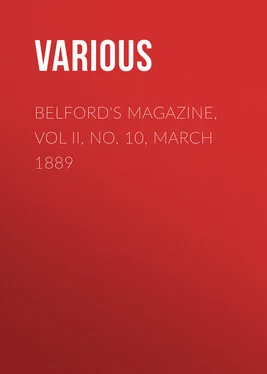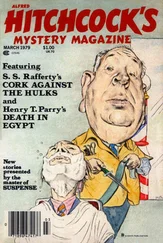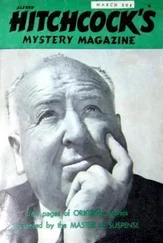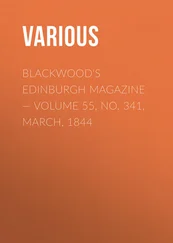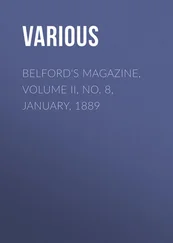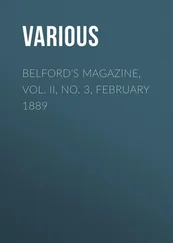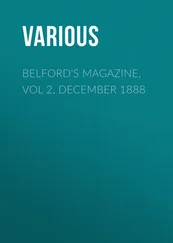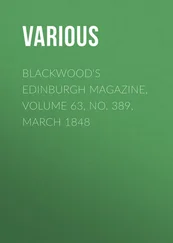Various - Belford's Magazine, Vol II, No. 10, March 1889
Здесь есть возможность читать онлайн «Various - Belford's Magazine, Vol II, No. 10, March 1889» — ознакомительный отрывок электронной книги совершенно бесплатно, а после прочтения отрывка купить полную версию. В некоторых случаях можно слушать аудио, скачать через торрент в формате fb2 и присутствует краткое содержание. Издательство: Иностранный паблик, Жанр: periodic, foreign_edu, на английском языке. Описание произведения, (предисловие) а так же отзывы посетителей доступны на портале библиотеки ЛибКат.
- Название:Belford's Magazine, Vol II, No. 10, March 1889
- Автор:
- Издательство:Иностранный паблик
- Жанр:
- Год:неизвестен
- ISBN:нет данных
- Рейтинг книги:5 / 5. Голосов: 1
-
Избранное:Добавить в избранное
- Отзывы:
-
Ваша оценка:
- 100
- 1
- 2
- 3
- 4
- 5
Belford's Magazine, Vol II, No. 10, March 1889: краткое содержание, описание и аннотация
Предлагаем к чтению аннотацию, описание, краткое содержание или предисловие (зависит от того, что написал сам автор книги «Belford's Magazine, Vol II, No. 10, March 1889»). Если вы не нашли необходимую информацию о книге — напишите в комментариях, мы постараемся отыскать её.
Belford's Magazine, Vol II, No. 10, March 1889 — читать онлайн ознакомительный отрывок
Ниже представлен текст книги, разбитый по страницам. Система сохранения места последней прочитанной страницы, позволяет с удобством читать онлайн бесплатно книгу «Belford's Magazine, Vol II, No. 10, March 1889», без необходимости каждый раз заново искать на чём Вы остановились. Поставьте закладку, и сможете в любой момент перейти на страницу, на которой закончили чтение.
Интервал:
Закладка:
And, in truth, as there are obvious reasons why lawyers make the best judges, ci devant thieves the best detectives, reformed drunkards the best temperance advocates, and the scared sinners (like John Bunyan) the best preachers, so there are obvious reasons why an artist's opinions of the productions of creative art, especially of the productions of that branch of it wherein he labors himself, should have peculiar value. His intimate acquaintance with the principles of art should not be detrimental to his perspicacity as a critic. Fielding's success with Parson Adams would not, I conceive, be any hindrance to his success in a criticism of the character of Lieutenant Lismahago, nor would the packed essences of "Esmond" prove Thackeray incapable of passing a competent judgment on "David Copperfield."
The fact is, practice has its advantages over theory. To the intelligent, experience is something more than mere empiricism, and some value must be conceded to personal experience. Theory is a wench of great personal attractions, with the coquette's knack of making the most of them; but she bears the same relation to her plainer, plodding elder sister Practice that Mark Twain bore to the invaluable Dan, when that doughty henchman was deputed to take exercise for the languid humorist. Mark might have the liveliest idea of the rugged grandeur of the Alps, but Dan knew the toils of the ascent and the glories of the higher prospects; and though Mark was an invincible theoretical mountain-climber, Dan would be apt to prove the more trustworthy guide.
It was with the view of securing the directions of practical guides for the reader, in another field of exploration, that the present paper was written. I may say at once that my object in seeking the notes – so kindly and courteously placed at my disposition – was not to gratify idle curiosity with any pungent mess of personal gossip. That dignified office I gladly leave to the accomplished purveyors of the Society papers. But I conceived that the curtest expression of the genuine artist concerning the productions of his own art could not fail to be valuable as well as interesting. The critics, like our creditors, we have always with us, to remind us we are still far from Zion, and the former are just as indispensable to us, in the present state of the world, as the latter. Unfortunately, neither enjoy immunity from the universal law of human imperfection. Creditors are not always generous nor critics always just. One grave difficulty with the latter is the insidiousness of personal predilection, which cannot be wholly excluded from the catholic judgment. Different judges have different tastes. One may have a preference for Burgandy and the other for champagne, while a third may prefer old port to either. The moral is obvious, and points to the prudence of occasionally bringing producers and consumers face to face; having done which I will withdraw for the present.
Dear Sir: It is difficult to say off-hand what novel I consider my prime favorite. So much depends upon the mood of the moment and point of view. I should say, generally, that the "Vicar of Wakefield" surpassed all English tales, if I did not remember that Fielding had created Parson Adams; but again, I have got more pleasure out of Dickens' masterpiece, "David Copperfield," than all the others put together. Yes, I fix on "David Copperfield" – from which, you will gather that I do not solicit in fiction the kind of romance I have myself tried to weave.
Again, in all the region of foreign fiction, I see no such figure as Balzac, and no such pathetic creation as "Cousin Pons." That to me is a divine story, far deeper and truer, of course, than anything in Dickens, but alas! so sad. While I tremble at Balzac's insight, I have the childish faith of Dickens; he at least made the world brighter than he found it, and after all, there are worse things than his gospel of plum-pudding. When I am well and strong and full of life, I can bear the great tragedians, like the Elizabethan group, like Balzac; but when I am ill and wearied out with the world, I turn again to our great humorist to gain happiness and help.
Robert Buchanan.My Dear Sir: I am not a great reader of novels. My favorite reading is dramatic poetry and old ballads. Few novelists can have read fewer novels. During the last five years I have certainly not read a score of new ones. But I am constantly reading in the old ones. Portions of chapters that live vividly in my memory, scenes, passages of dialogue, scraps of description – these I read and re-read. I could give you a list of fifty favorite passages, but I would find it hard to say which is my favorite novel. The mood of the moment would have much to do with any judgment made on that head. When I am out of heart Scott suits me well, for his sky is always serene. When I am in high spirits I enjoy Thackeray, for it is only then that I find any humor in the odd and the ugly. Dickens suits me in many moods; there was not a touch of uncharity in that true soul. There are moments when the tenderness of Richardson is not maudlin, and when his morality is more wholesome than that of Goldsmith. Sometimes I find the humor of Sterne the most delicious thing out of Cervantes, and sometimes I am readier to cry than to laugh over "The Life and Deeds of Don Quixote." So that if I were to tell you that in my judgment this last book is on the whole the most moving piece of imaginative writing known to me, – strongest in epic spirit, fullest of inner meaning, the book that touches whatever is deepest and highest in me, – I should merely be saying that it is the last romance in which I have been reading with all the faculties of mind and heart.
I like, at all times and in all moods, the kind of fiction that gets closest to human life, and I value it in proportion as I think it is likely to do the world some good. Thus (to cite examples without method) I care very little for a book like "Vathek," and I loathe a book like "Madame Bovary," because the one is false to the real and the other is false to the ideal. I see little imagination and much inexperience in "Wuthering Heights," and great scenic genius and profound ignorance of human character in "Notre Dame." In Gogol's little story of the overcoat, and in Turgeneff's little story of the dumb porter I find tenderness, humor, and true humanity. I miss essential atmosphere in Godwin's masterpiece, and the best kind of artistic conviction almost throughout Charles Reade. It makes some deduction from my pleasure in Hawthorne that his best characters stand too obviously not for human beings only, but also for abstract ideas. I like George Eliot best in the first part of "Silas Marner," and least in the last part of "The Mill on the Floss." Perhaps I set the highest value on my friend Blackmore among English novelists now living. I find Tolstoï a great novelist in the sense in which his fellow-countryman, Verestchagin, is a great painter – a great delineator of various life, not a great creator. Björnson, the Norwegian novelist, in his "Arne" seems to me a more imaginative artist than Doré in his "Vale of Tears." I do not worship "Manon Lescaut," and I would rather read "Les Miserables" than "Germinal." In short, to sum it up in a word, I suppose I am an English idealist in the sense in which (if I may say so without presumption) George Sand was a French idealist. I think it is the best part of the business of art to lighten the load of life. To do this by writing mere "light literature," the companion of an idle hour, a panacea for toothache, a possible soporific, would seem to me so poor an aim that, if it were the only thing before me I think I would even yet look about for another profession. Fiction may lighten life by sterner means – by showing the baffled man the meanness of much success, and the unsuccessful man the truer triumphs of failure. To break down the superstitions that separate class from class, to show that the rule of the world is right, and that though evil chance plays a part in life, yet that life is worth living – these are among the functions of the novelist. In reaching such ends there are few or no materials that I would deny to him. He should be as free as the Elizabethan dramatists were, or even the writers of our early ballads. His work would be various in kind, and not all suited to all readers; but he would touch no filth for the distinction of being defiled. It would not trouble him a brass farthing whether his subject led him to a "good" or a "bad" ending, for he would have a better ambition than to earn the poor wages of a literary jester, and his endings would always be good in the best sense where his direction was good.
Читать дальшеИнтервал:
Закладка:
Похожие книги на «Belford's Magazine, Vol II, No. 10, March 1889»
Представляем Вашему вниманию похожие книги на «Belford's Magazine, Vol II, No. 10, March 1889» списком для выбора. Мы отобрали схожую по названию и смыслу литературу в надежде предоставить читателям больше вариантов отыскать новые, интересные, ещё непрочитанные произведения.
Обсуждение, отзывы о книге «Belford's Magazine, Vol II, No. 10, March 1889» и просто собственные мнения читателей. Оставьте ваши комментарии, напишите, что Вы думаете о произведении, его смысле или главных героях. Укажите что конкретно понравилось, а что нет, и почему Вы так считаете.
